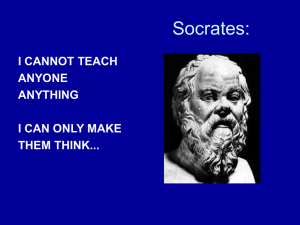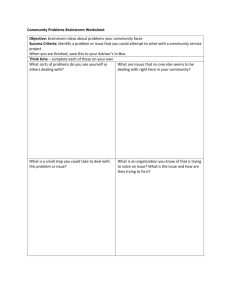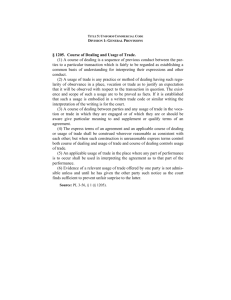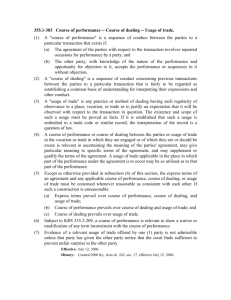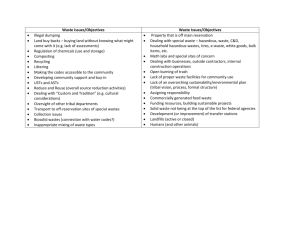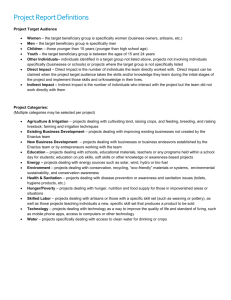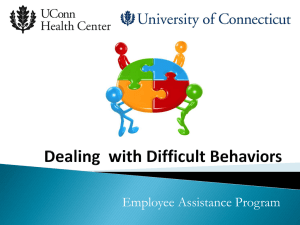Resolving Conflicts at Work
advertisement
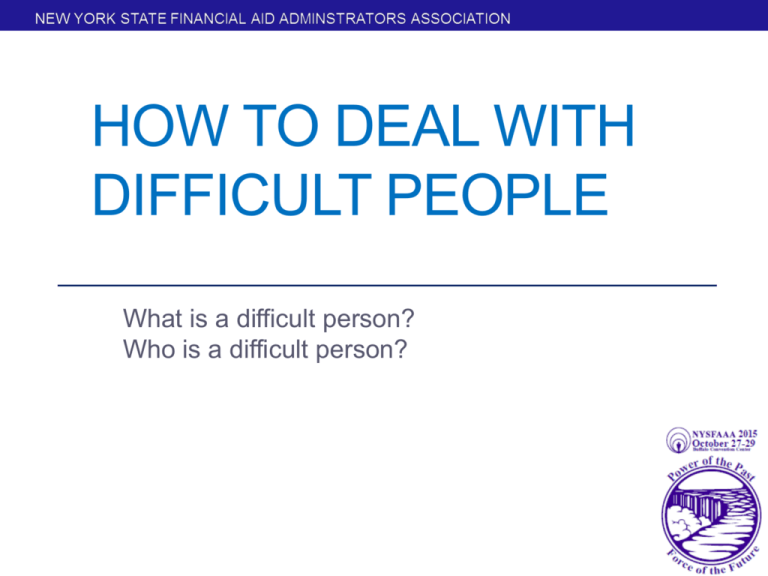
HOW TO DEAL WITH DIFFICULT PEOPLE What is a difficult person? Who is a difficult person? Our approach • • • • • • What is and is not a difficult person General steps to manage difficult people Dealing with difficult employees/subordinates Dealing with a “tough” boss Dealing with difficult co-workers (no supervisory authority over them) Dealing with difficult behaviors 2 Exercise • Let’s do some thinking……How do you define a difficult • • • • • person? Who is a difficult person in your life (don’t give us names)? What characteristics/behaviors/attitudes make that person difficult? What makes you difficult? What are your biggest problems in the workplace re: difficult people? What are the consequences in the workplace of your difficult person? Person or Behavior “Define the person as a problem and you’re in trouble. Define it as a behavior and you can do something.” Ken Cloke, Joan Goldsmith authors of Resolving Conflicts at Work. React or Interact Perhaps we need to change how we interact with difficult people rather than react to them. If you can predict it, you can plan for it. Easier said than done? What is a difficult person? • • • • Attitude or behavior detrimentally affects the organization Usually aware of behavior Not someone you simply dislike Not always their behavior, but your perception of their behavior. 10 What about circumstances? • What role does your leadership/management style have in the situation? • What about your corporate/departmental culture? • What about other differences like gender, generational, age, etc.? Some Difficult People: • • • • • • • • Are different, not difficult Don’t have a clue Are stuck in the past Stuck in emotional kindergarten Have low self-esteem Are having a bad _____ Holding onto beliefs Want too much 15 Some Difficult People: • • • • • Are substance abusers Are mentally ill Sick and tired Are malicious (a few) ‘Evil’ (desire to cause harm with no remorse) 16 What motivates a difficult person? • • • • • Driven by the need to control their environment A need to stir things up and push your buttons Behavior gets what he/she wants without consequences Wants validation and wants to be listened to Doesn’t have boundaries and wants/needs them 17 How does a Difficult Person affect an organization? • • • • High turnover rate Decline in productivity Lowered employee morale Others? 18 Differences between resolving conflict and managing a Difficult Person • • • • Resolving conflict is a process to create immediate results Managing difficult person is long-term due to time necessary to change behavior If you change behavior, thinking usually follows May not solve all problems – and that’s okay 19 Dealing with Difficult People (3 big myths) • • • • Myth 1: Difficult people are always opportunistic Myth 2: Difficult people can’t change Myth 3: You can always give them the cold shoulder [Is it okay to call them difficult people? Or should we say “we can change difficult behaviors”?] 20 Everyone’s Options • • • • • Do nothing Change the person Change your behavior Understand the behavior and then decide how to handle [Let’s discuss other options in relation to “types.”] 21 Steps to Manage a DP • • • • Assess the situation Identify the difficult personality type Address the person (will discuss tactics) Monitor the person 22 Ah, Dilbert Assess the situation • • • Is the person truly difficult? Is it a behavior? Or is it just the situation that brings out the worst? What are your hot buttons? Do you ever push the buttons of others? If so, why? 24 Assess the Situation • How? Determine: • • • • When behavior began Exact nature of behavior Potential reasons Behavior’s affect on productivity Assess the Situation What role does corporate/department culture play? What about leadership/management style? Identify the difficult personality type • • • • • • • [Not the behavior, per se, but the personality type] Hostile-aggressive individuals Withdrawn individuals Egotistical individuals Deceitful individuals Super-Agreeable Indecisive 27 Address the person Calm hostile-aggressive individuals Involve withdrawn individuals Focus on needs of egotistical individuals Ask deceitful, super-agreeable and indecisive individuals probing questions Might also ask indecisive individuals what his/her spouse or good friend would do Other suggestions? [Behaviors are coming up and we will discuss overall tactics shortly] 28 Monitor the person • • • Why? Keep track of improvements in behavior Meet with the person periodically Check in regularly with the person and comment favorably on any improvements 29 Dealing with Difficult Subordinates/Direct Reports • • • • • • Slackers/Procrastinators Chronic Complainers Rebels Uncivil Subordinates Intentional troublemakers Others? 30 Slackers • “I’ll get it done” or “it’s on my list” people • Strategy: Highlight commitment in such a way that it has to be taken seriously Commitment in writing Select strange deadlines Make time management a formal part of review • • • 31 Chronic Complainers • • • • Strategy: Don’t fight the trait-point it in the other direction Highlight when complaint actually proves productive Ask for help in area of your choosing Ask ‘complainer’ to report discrepancies to you confidentially – not to everybody 32 Rebels • • • Strategy: Give them the chance to do it ‘their way’ (within reason) In trade for a little freedom, gain commitment to behave by the rules in other areas (especially communication) Don’t dictate how to do it – observe what happens when you let them do what they want 33 Uncivil Subordinates • • • • • Strategy: You must set and maintain appropriate limits in verbal communication Praising skills and traits you hope to improve Setting appropriate personalized goals – informal and in writing Maintaining clear limits Re-assign to different physical area 34 Dealing with a Difficult Co-Worker (other types) • • • • • • Chatty neighbor The slanderer The “best friend” The “thief” The “secret agent” The “clinger” 35 Dealing with a Difficult Co-Worker (other types) • • • • Won’t ask for help Messy desk Can’t say no Latecomer/tardy individual 36 Building a Relationship with a ‘Tough’ Boss Focus on Relationship – NOT personality – list what’s important Strategies to help a boss who: • • • • • Doesn’t know what to do Is manipulative Is emotional and acts out 37 Dealing with a Difficult Person • Change your reaction to them • • • • • • • • • Person worth getting upset over? Destructive behavior? Truly affecting me or am I letting it get to me? Can I let person’s behavior go and go on? Do you have fears in dealing with behaviors? Are you the only one who struggles? What are your hot button issues? What involvement do you have? Why is this behavior difficult for you? 38 Dealing with a Difficult Person • Understand the other person • • • • • • • • • Take a deep breath and really listen…and body language too Do not argue your position Repeat back to ensure you understand his/her perspective Ask questions to clarify anything Cite specific examples and avoid inclusive statements like “you always …..” Pay attention to your words…. Make specific note of the change you want and the consequences Note the behavior, not the person Request feedback 39 Dealing with a Difficult Person • Influence his/her attitude • State specifically (non-confrontational) how behavior has affected you – Use “I” “You” statements • Do not place blame or fault Focus on preventing the problem from recurring in the future Keep your cool • • 40 Dealing with a Difficult Person • • • • • • Act instead of react (do you know it’s coming) Maintain your boundaries Don’t fall into negativity trap (allow venting for a specific time) Is it personal and are you taking it that way? Don’t necessarily agree and don’t stay silent Solve the problem (even cut them off) 41 Dealing with a Difficult Person • Resolve the problem • • • • Discuss the cause and effect of the problem behavior and ways to deal with it Ask questions to get information Remember, you can’t change personalities, only your reaction Are there others in the office who might reach out? 42 Dealing with a Difficult Person • Recover and go on • • • Once problem is addressed, don’t hold a grudge Don’t mention it again; move on Dwelling on it only causes you stress and frustration 43 What else can we do? • Questions, comments?
